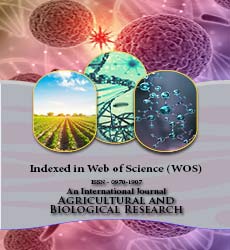Agricultural and Biological Research
RNI # 24/103/2012-R1
Zelalem Telila Geleta, Yohannes Shifera Daka*
Vermicomposting is the bioconversion of organic waste into a bio-fertilizer due to earthworms’ activity and it is operated in mesophilic conditions. PH and moisture content levels shall be optimized. The vermicomposting process takes place in vermin-reactors. In the vermicomposting method microorganisms begin the process, but it is the red worm that plays the largest role in converting organic matter. In this study, vermicomposting process was conducted to evaluate performance of epigamic earth worm species of Eisenia fetida in 60 days to change on the three biodegradable wastes (Coffee husk, paper waste and vegetable wastes) in Begi town. Two of the wastes (coffee husk and paper wastes) were mixed with cow dung 3:1 ratio and vegetable wastes without cow slurry treated with Eisenia fetida (tiger worm). Thirty (30) numbers of matured earth worms were inoculated on the three substrates and monitored for 60 days. Each waste was observed three times at intervals of 0 day, 30 days and 60 days. Characterization results showed that there is a change of pH, EC, OM, OC, TN, C:N, AP, EK, ash from initial day to final day, 0 and 60 day (pH 7.51-7.03, EC 1.91 mS/cm-1.24 mS/cm, OM 47.06-29.21%, OC 27.3-16.93%, TN 1.38-2.199%, C:N 21.39-8.63, AP 11.17-20.85 ppm and EK 2.26-4.43 mg/k ) were found. The finding from the study showed that, the vermicomposting produced have matured and have quality when compared with WHO and ISIRI standards. The obtained vermicompost had an excellent nutrient status confirmed by the chemical analyses and contained essential nutrients. Vermicomposting could good option to recover biodegradable wastes from the town and simultaneously produces organic fertilizer
